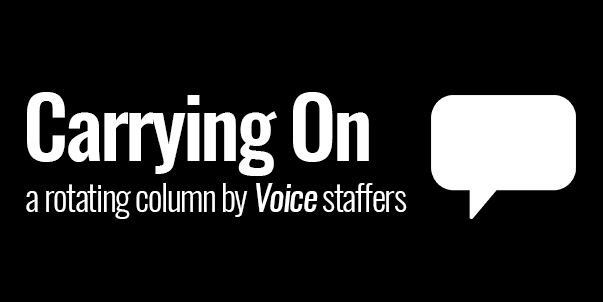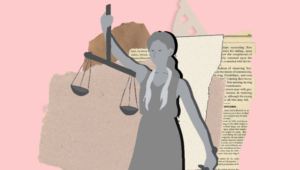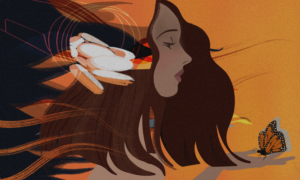I have always tried to find a simple way to define my personality. Quite often, I become curious about why I feel the way I feel or why I like the things that I like. Like many others, I struggle to feel “normal” at times. Suddenly feeling like the odd man out while participating in a group conversation is not an uncommon experience for me. Missing the joke or slightly miscommunicating in conversation can lead me to spiral into total anxious confusion. Why do I feel different? Is feeling different itself some sort of identifier?
There are some adjectives I have heard throughout the years that let me wear some sort of distinct identity on my sleeve: alternative, friendly, indecisive, nerdy, quiet. These words, given to me by myself and others, are definitions now attached to me. If asked to describe myself, they would speed into my head. But I am the type who seeks more than these simplistic, straight-forward descriptors. After great deal of personal reflection and a small bit of Internet scouring, I tried to find a more effective means of self-diagnosis.
The Myers-Briggs Type Indicator is, according to the ever-credible Wikipedia, “an introspective self-report questionnaire designed to indicate psychological preferences in how people perceive the world and make decisions.” This test has been extremely popular across the Internet as a means of finding soft, easy answers to complicated personal psychology. According to Myers-Briggs, I am what is called an “INFP.” The four-letter code stands for Introverted, iNtuition, Feeling, and Perceiving. There is a great deal of information I could delve into related to each subsection, but the INFP title itself gives a more distinct definition. Referred to as “idealists,” INFPs are typically creative, relaxed, quiet, and loyal, with a somewhat rigid value system. These “idealists” prefer the arts and enjoy self-exploration for greater understanding of the world around them. Also, according other credible Internet sources, I share in the INFP type with Søren Kierkegaard, John Lennon, and Björk—so I have that going for me, which is nice.
The basics of what I read about INFPs seemed to really hit the nail on the head in describing who I felt I was, so I looked into more about what this test could tell me about myself. Apparently, I have a knack for picking up languages. Eight-plus years of unsuccessfully attempting to learn Spanish has firmly told me that this is not the case. I am also supposed to be very adept at thinking quickly on my feet, both in action and in conversation. After many attempts at playing it by ear through the course of my life, I can say with certainty that this is not a strong suit for me.
 Despite its less than perfect predictions, I like the idea of the Myers-Briggs test because it provides a map of the human mind. This is great on paper, but I think it is too easy to let this system become self-fulfilling. We can allow these characteristics to dictate how we behave instead of the other way around. Can two psychologists who have never even heard of me really define who I am? Although interesting, INFP is no better than the labels I had already given myself.
Despite its less than perfect predictions, I like the idea of the Myers-Briggs test because it provides a map of the human mind. This is great on paper, but I think it is too easy to let this system become self-fulfilling. We can allow these characteristics to dictate how we behave instead of the other way around. Can two psychologists who have never even heard of me really define who I am? Although interesting, INFP is no better than the labels I had already given myself.
My experience with the Myers-Briggs personality test speaks to the dangers labels—whether they’re internal or external—pose. Especially at Georgetown, there constantly seems to be this pressure to define oneself, to find some “bullet points” to categorize oneself into in the campus community. You need to be involved to a certain extent—to have a defining “thing”—or you are nonverbally deemed “unsuccessful.” We use labels to convince ourselves that we are “succeeding” in our college experience. Consider the girl in the SFS who’s written off as only concerned with what is going on with the IRC, or the guy in the Hoya Blue who comes to be defined almost solely by his school spirit. Labels reduce these people to a few “defining” features, overlooking the breadth and depth of their personalities in the process. There are certainly more to these people than this, but perception locks them in. I am completely guilty of taking part in this sort of labeling myself, and I find it difficult to enjoy my interests, or even the things I participate in to try and advance myself into the professional world, when they begin to shift from my interests to what defines me.
Whether it is socially or self-generated, there is a pressure to fully devote oneself to clubs or the high-coveted internship on the Hill in order to fit in. This can often come from a fear of the unknown; one must be the most prepared for the professional world, with all its uncertainties. You need to rise through the ranks of your on-campus organizations with die-hard devotion, or you are somehow falling behind. This force is so strong that we can lose the distinction between ourselves and our work. It is another level of letting our personalities, our identities, be hijacked by our environments. Even our own well being becomes a product of our environment. Classes, the great unifier of Georgetown students, become the core of our constant pressure to feel “successful.” Quickly the question, “How are you doing?” merits the response of how many midterms you have left. It may be an easy way of saying I’m stressed, or I’m scared, but this collegiate Newspeak turns us into our work and our work alone.
Yes, I am on the Ballroom Dance Team on campus, but I do not love when I am approached with the question, “You’re the guy who waltzes, right?” I find it difficult to enjoy this hobby when it begins to shift from one of my interests to what defines me. I cannot say if I start to feel this way because of others, or if it is because I give the title to myself and then resent it. We all find ourselves letting our desire to find some self-validating activity or interest dictate our feelings and behavior more than it should at times. People should certainly be passionate about what they do, and it is good to be concerned about the future but is there not a certain point at which any view can do more harm than good by controlling your life, your relationships to others?
I admit that I do not always know what is best, how to overcome the problem of being defined by the terms what I do or how others people perceive me. It would be much easier if I did, but I think that life cannot have any unwavering definites. Giving someone a distinct answer would make me no better than our friends Myers and Briggs. My INFP test result is merely a suggestion. Similarly, I suggest to you take everything with a grain of salt. Think about the convictions you held five years ago. Do you still hold true to every value that you held then? Is it worth it to accept a label so intently that you end up alienating yourself from other people around you? I, for one, refuse to write myself off as only an arts-driven introvert. I may be much better in the humanities than the sciences, but that does not mean I will not try my hand at introductory chemistry. I may not agree with the politics of others around me, but that does not mean I will not get to know them for the interesting people they may be. I may be an introvert, but it will not become my justification for not putting myself out there. At this point, I don’t think I can give you an answer to the question, “Who am I?” But who knows? Maybe I just haven’t found the right personality test yet.
Michael Bergin is a sophomore in the College and a Halftime leisure editor for the Voice. Carrying On is a rotating column by Voice staffers.




